
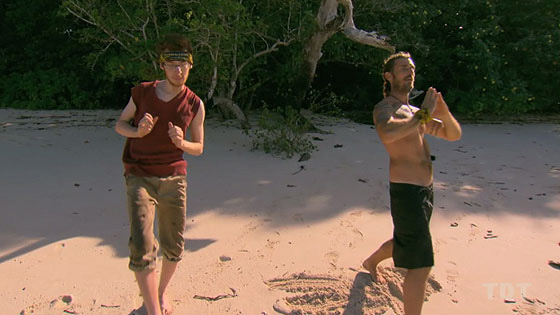
1) As we hear the members of all Final Threes say no one gets through the game without lying.
Even the most “ethical” of players indulge in deceit; they insist they haven’t, of course, but they do. Not only is there is a layer of untruth inherent in the game – the necessary fiction that they’re ever truly a tribe – but there is also the unavoidable reality that all castaways, no matter how honest, lie to themselves.
Here’s what I mean by that: We all have an ego, we’re all at the center of our own universe. This is heightened in the game of Survivor: In the end, despite agreements and alliances, only one person wins. And all of them – even the most antagonistic, aggressive, and annoying of them – think they can win.
And yet the game asks players to subsume that individuality for the good of the group. Castaways have to collaborate. They have to trust people who can’t be trusted, and make other people trust them, despite everyone knowing that they’re all out for themselves. Moreover, they have to believe that they’re trustworthy, believe that they’re good people, believe that they’ll never betray the people they know in their hearts that they’re going to have to betray.
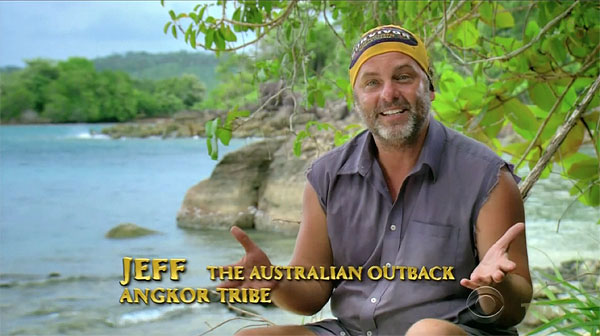
2) So here’s what players do:
...they lie to everyone about who they are (psychologically, socially, emotionally); more importantly, they lie to themselves, so that their lies are believable, so that their words are imbued with the palpability of truth.
Some players are really, really good at this, possessing the ability to convince the self so deeply that the lies resonate with truth. The other players are willing collaborators in this shared fiction, of course, complicit in their own delusions; all players are looking for something, someone to believe, because the alternative is paranoid isolation. Tell someone, anyone, everyone that you’re in this together in a way that they believe you, and they’ll never see the dagger coming.
That’s the key word, I think: Everyone. The cast collaborates. And yet within that group, everyone is alone, eager to outmaneuver, selfishly motivated by whatever drives them (greed, competitiveness, validation).
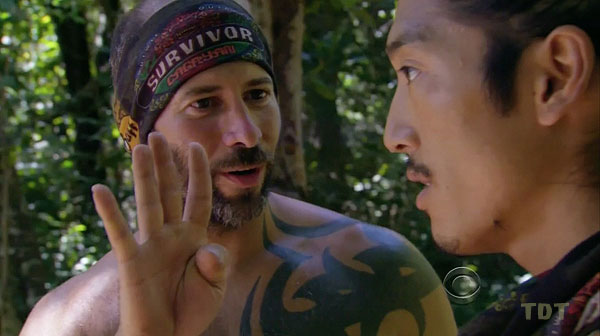
3) It’s perhaps the most fundamental paradox of Survivor:
To win, you have to advance your own game at the expense of others, while assuring everyone around you that you’re no threat to their existence.
It’s no small task, to be worthy of winning, to be the protagonist of the story, while convincing each of the other players that you are a support character in their journey to inevitable victory. One not only has to lie, but BELIEVE every lie one tells. We all know, on a primal, amygdala-deep level, if we can trust someone; we FEEL truth, and when we get it, we return it, and when we don’t, it’s almost impossible to get it back.
Obviously, trust is as critical as it is rare in Survivor. This is especially true in a second-chances season, where all of the players have either been burned, done the burning, or both. To have a chance to win this season, then, takes the rarest of skills: being able to convince the other players that you’re trustworthy when everyone knows, or suspects, you’re not.
To do this requires players to set aside ego. To be the group, not the individual. To be needed, not feared.
Needless to say, some players are good at this. Others… not so much. Let’s take a quick look at some of them, shall we?
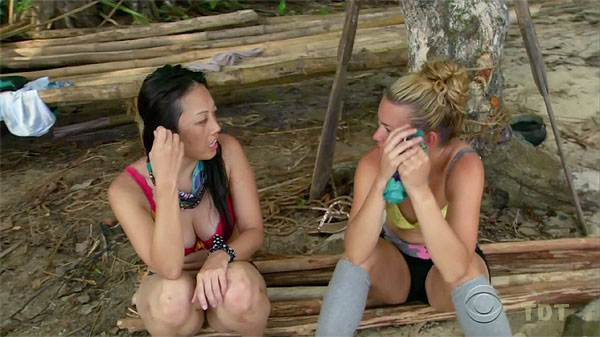
4) Peih-Gee
Unfortunately for Peih-Gee, she became the first target of Abi-Maria’s ire; this was going to happen to someone, of course, because that’s what Abi does, picks targets and destroys games. It’s arguable that there was nothing Peih-Gee could have done under the circumstances, given that the bracelet debacle was a blameless convergence of unfortunate happenstance and passive-aggressive smear campaign. But one could argue – as I am now – that Peih-Gee could and should have removed ego from the equation, groveled for forgiveness (because that’s the only thing that would have encouraged Abi to pick a different target), rather than feeling the need to defend herself, to stand up to her accuser, to be an individual who wishes the other players to see her as someone who is in the right.
I’m not saying that this is a great path to follow in life, by the way. But in Survivor – and with someone like Abi – there is a need for the management of self in a micro-society. In the real world, you can walk away from Abi and never encounter her again. In the game, you have to placate her (without patronizing), and bide your time until the threat has been removed by a group of players who tire of Abi’s antics and who, to avoid becoming the next target of her emotional vicissitudes, collectively agree she’s gotta go.
Which is a long-winded way of saying this: Peih-Gee’s game ended because of ego. Forgetting the agrarian maxim to not wrestle a pig, Peih-Gee got dirty, and Abi liked it. Had she appeased Abi, and allowed Varner to remain the target, Peih-Gee would still be in the game.
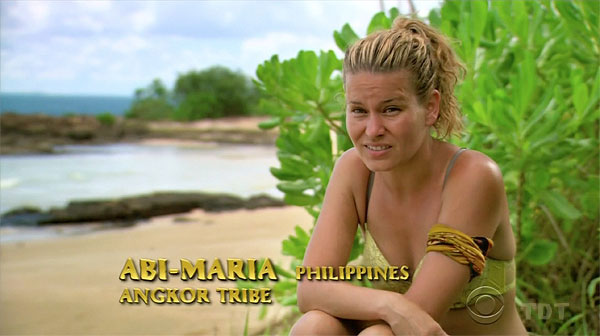
5) Abi
From a psychological perspective, Abi is fascinating: within the confines of the game, she’s about as ego-driven a player as you’re likely to find. Every decision is undeniably personal; every vote is a condemnation of someone who has aggrieved her. Her ability to endure in the game has nothing to do with strategic acumen; she simply picks a target, sometimes with encouragement from those who understand how to arm and aim her (for she’s a weapon to be used by others), and then players who are simply relieved it won’t be them this time pile on and Abi gets her way.
Everything that Abi says, does, or thinks is viewed, with unreflective conviction borne of insecurity, through her distorted prism of self; she listens only to those who have stroked her ego consistently (and recently). More than anything, it would seem, she wants to be wanted. Those who are not with her are against her, and, being both paranoid and vindictive, she turns anyone – outside or inside her alliance – into enemies. This most often happens with other female players; while Woo might currently reside in her cross-hairs, Abi is far more likely to turn on players like RC, Shirin, and Peih-Gee (note that they are all aggressive female strategists). Again, this may be the product of insecurity – she does not want to be made a fool of by women who possess a skill set far different from her own – but there is also an edge of sexuality to it: Abi likes the attention of men while being combative, competitive, and vindictive with women. I don’t pretend to be a psychologist, but I bet a good one would have a lot to say about Abi, gender roles, and the desire to be wanted and needed.
Perhaps, when you get right down to it, Abi is the most Survivor honest player of all: She knows, on some instinctual level, that everyone is out to get her (the game reflecting and augmenting her own insecurity-fueled paranoia). She cuts through the lies all of the players tell each other, the convenient, short-term fictions that hold alliances together, and sees things as they are: everyone around her wants her out, some sooner, some later. Even if she does not possess this level of self-awareness and game ability – and I don’t think she does – in the end, it does not matter: When a player is this selfish from the outset, making everything personal, making it all about her, there is no way she can win the game.
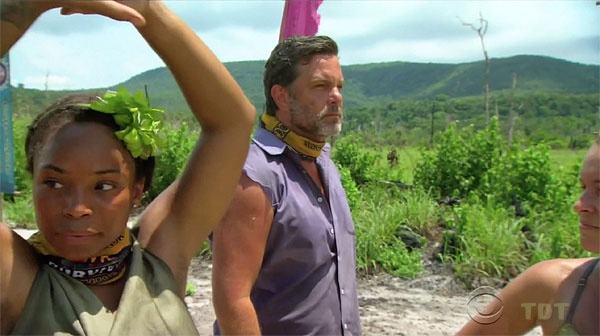
6) Varner
Varner is an interesting contradiction: He is extraordinarily capable of talking himself into the majority, forming a bubble of believable B.S. that convinces people that he’s on their side. Charisma, southern charm, empathy – call it what you will, but Varner possesses that enviable Survivor skill to alter perception and get people seeing the game as he wishes them to see it.
And yet, despite this ability to convince others that he has the group’s best interests at heart, his ego keeps getting in the way. HE chose to flip in the first vote because HE felt the old schoolers weren’t playing the game the way HE felt it should be. HE convinced everyone to target Shirin because HE thought she was the biggest threat. HE reached out to Kelly after the challenge because HE felt HE knew who she should align with (because working with Kimmi and Monica would eventually help HIM).
Side note: Varner’s “mistake,” which, despite his Tribal Council protestations to the contrary he remembers perfectly well, reveal just how individual his motivations really are. He wants Kelly to align with Kimmi and Monica… he plans to bring Abi along with him… and augment that alliance with loyal yet targetable challenge threats like Terry and Woo. With those seven working together after the merge, they’ll be in the majority. Eventually, Varner plans to be surrounded by four loyal goats; he’ll pick two to take to the end, and he’ll pocket the million. It isn’t going to play out this way, of course, but that’s what I think he’s thinking.
It is only a matter of time before Varner’s persistent “me first” approach – which started before the game even began (he came in not wanting to make friends, which is all well and good in theory, but you NEED friends and connections and genuine emotions to endure) – makes Varner a target. Just wait: after the merge, the other players will talk about Varner as dangerous because he’s only looking out for himself. They won’t trust him, at least not fully, because they’ve felt from the outset that he’s in this for himself, they’ve understood on a deep interpersonal level that he isn’t there for them, and they’ll have ample proof at that point to back up those feelings (which will easily and readily be corroborated by others).
In the end, the other players will turn on him because they no longer believe his lies (and would prefer to believe someone else’s).
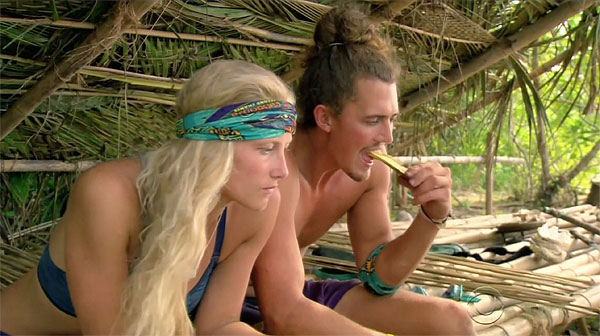
7, 8 & 9) A rapid fire look at a bunch of the other players.
Joe: It’s utterly impossible for this guy to play anything other than an ego-driven game; it’s not like anyone would believe him if he insisted that he wasn’t a threat. He’s doing a great job trying to emphasize the group facets of the game: dominating in challenges physically and mentally, providing food, making camp comfortable (and, if you’re like Kass and find him irrepressibly attractive, beautiful). The problem is that he goes above and beyond. Hammocks, Joe? Really? He could be beyond selfless – carrying sick or injured tribe mates over finish lines, giving away hidden immunity idols, allowing everyone else to see their loved ones while he’s forced to eat 47 pounds of balut – and it just won’t matter: he will be viewed as an individual, one who could easily win the game, and go home once his role as provider, voter, and savior is no longer needed.
Kelley: So far, she’s playing an impeccable flawless/selfless game. She’s deferential to the power brokers (as she was with Varner), she’s strategically informative with her swapped tribe mates (telling them that Terry has been searching tirelessly for the idol, which may very well be true), and she’s an asset to her team (as an athlete, camp contributor, and positive presence). She’s also kept the secret of her idol to herself; while this may seem like a selfish move, and to some degree is, it also allows her to establish relationships with her new tribe mates without them being warped by the existence of the idol. On a tribe of 6, idols can disrupt and destroy the very idea of team unity, and I think Kelley knows that.
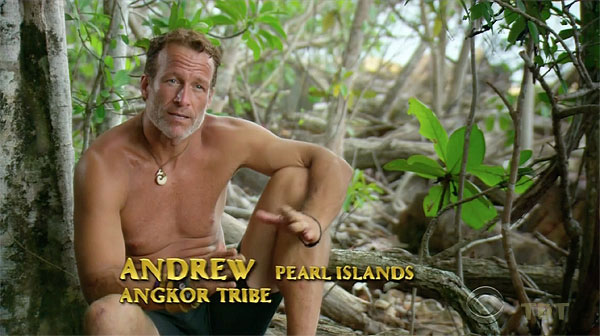
Savage: Everything about Andrew is ego. And why wouldn’t it be? He’s gone out of his way to tell us about his perfect life, and shared his “handsome and intelligent lawyer meets and marries a model” story with his tribe mates; someone with that sort of daily existence in real life has had his view of himself validated almost constantly for most of his adult life. But this has led to a number of unwise approaches within the game: After the swap, he tells Woo and Peih-Gee they need him. Despite being down in the numbers, he and Tasha magnanimously offer Varner a spot on the jury. He thinks Stephen isn’t worthy or deserving because he doesn’t possess the same rugged, captivating qualities that he himself possesses (and thus values). Even his team-based declarations seem to be motivated by a need to be out front, to be a leader, to be the hero. Ego, ego, all of it. Which leads me to this brutal truth: He’s Abi, only nicer.
Spencer: An introvert by nature, Spencer is now reaching out, attempting to make meaningful connections. Finding himself on the bottom will serve him well, just as it did in Cagayan: the relationships he forges now he will have to betray later, but until that day comes, the other players will see him as trustworthy if only because he doesn’t have the numbers on his side. And yes, given the growth the producers are going out of their way to show us, Spencer is going to struggle with voting out people who have welcomed his friendship. He’ll do it anyway – what other choice does he have? – all while remembering that you can’t say alliance without “Lie.”

Tasha: She’s overcorrected since Cagayan, and now – reading the non-verbal cues of everyone around her – it appears that the other players aren’t responding well to her aggressive individuality. Appreciate her as a competitor? Yes. Need her for numbers? Absolutely. Trust her, like her, respect her? No and no and no.
Terry: The former military pilot is following the prototypical path of the frontrunner, playing as an individual when he feels like he’s in control (note the ego-saturated confessionals after Shirin went home), and experimenting with his social game only when he believed he was on the bottom. Yes, he’s all about the team, and excited by the prospect of working together, winning challenges, and not visiting Tribal Council until after the merge. But even that’s all about himself, too, because who benefits from the rhetoric of “stay strong as a tribe” more than he and his new best bud Joe?
*****
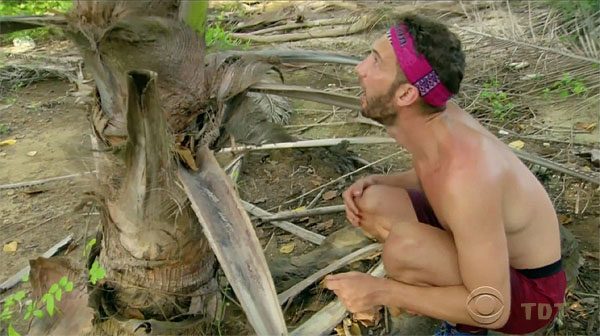
10) An Update on The Irrelevant Eight
Remember all of the talk after the premiere about the eight players who didn’t get an opening confessional?
Vytas, Shirin, and Peih-Gee were all on that list.
A quick look at the other five:
Keith: Looks like keeping his game the same (with “some minor tweaking”) has led him to become utterly inconsequential to the season-long story. His visibility will probably spike after the merge and tribe-based narratives give way to the individual tales to be told, but I think it’s safe to say that he’s not going to have much of an impact on the game. Which is sort of what I figured would happen once he got voted in by the recency-biased masses.
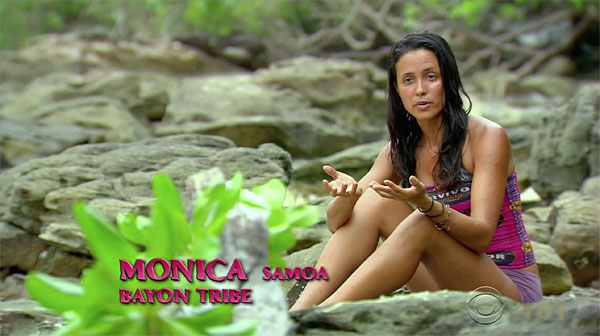
Monica: She spoke last week! Which can mean only one thing: She’s about to go all Parvati on us and dominate the game the rest of the way. No, not really, it just means she’s leaving soon; is there any confusion now why she’s a member of the I-8?
Stephen: The tribe shuffle definitely helped him. Why, then, didn’t we see him bonding with Spencer and having an early-season love fest with Kelly and Kimmi? Oh, right, because the edit showed Spencer connecting with Jeremy instead… which means that Stephen must be REALLY irrelevant.
Terry: The aging challenge beast is getting a fantastic edit. He’s established a social game, rebounded from an early betrayal, and tamed a Brazilian dragon (temporarily). He’s the one guy who shatters the Irrelevant Eight theory… his exclusion in the premiere is inexplicable.
Woo: He’s Abi’s next target. Unless she goes, he does. Say goodbye to the Woo face.
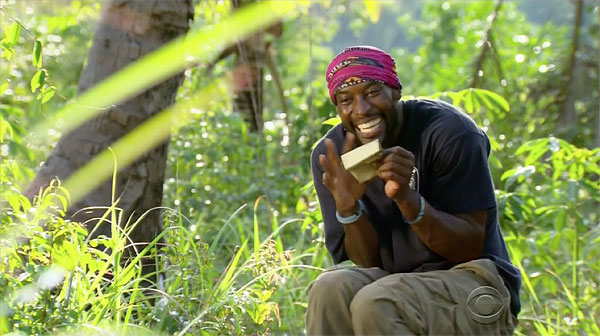
11) Fortunes Rising: Jeremy
He’s on a reasonably strong tribe (and they’re going to want to maintain that strength), he’s got Spencer as an ally, and he’s got two ready-made targets in Monica and Stephen. Oh, and he has an idol. It’ll be a major upset if he doesn’t make the merge, and once he gets there, he’s got the beginnings of a Cagayan/San Juan del Sur MEGAlliance™.
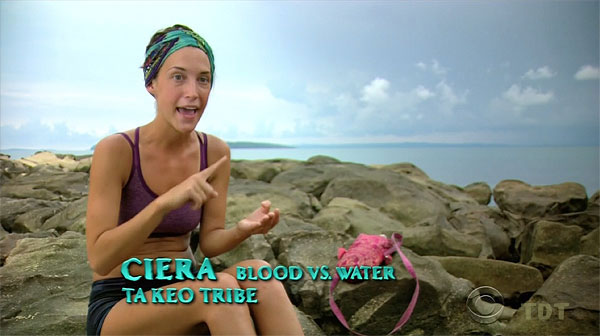
12) Fortunes Falling: Ciera & Monica
So many red flags: They’ve been largely invisible so far. They’re physically weaker women (always a danger in 6-member tribes). And they’ve suddenly broken their silence…
But that’s where the similarity ends.
Given her premiere confessional, which was reinforced this week, it’s clear that Ciera is going to be aggressive and at least try to make a move. Rather than taking place right now, though – when her tribe is unlikely to finish last in a challenge – this will probably happen when they swap into two tribes (7 vs. 7). My hypothetical scenario: She’ll attempt to form a majority alliance of four, but fail; if the move had succeeded, she would have been edited far differently so far this season. The good news is that she likely leaves with her head held high, because she went out trying to make the timely move she was unable to orchestrate her first time out.
Monica, on the other hand, is like gluten free food: she seems like the real thing (a Survivor player), but something essential is missing. A friend of mine recently made this prediction: “She’s not even going to get her own boot episode.” And you know what? He’s right. There are too many players for the weeks we have left. Monica’s gonna leave in a double-boot episode, which would be a most fitting end to an unremarkable return.
13) Prediction Time: Woo
Angkor looks overmatched. Abi wants Woo gone. And what Abi wants, Abi gets.
That’s it for this edition of The Baker’s Dozen – if you’d like to keep the conversation going, leave a comment below!
 Andy
Baker When he’s not blogging about
Survivor, Andy Baker helps run a Survivor-based LRG and is
podcasting about TV shows. Which is to say he spends
entirely too much time in front of the TV, typing on his
laptop and muttering about bad narrative decisions.
Andy
Baker When he’s not blogging about
Survivor, Andy Baker helps run a Survivor-based LRG and is
podcasting about TV shows. Which is to say he spends
entirely too much time in front of the TV, typing on his
laptop and muttering about bad narrative decisions.
Andy can be found on twitter: @B13pod.
- Index of articles
- Pregame: What's the Big Idea(s)?
- Ep.1: Narrative Acceleration
- Ep.2: The Contrarian Returns
- Ep.3: Every(one)
- Ep.4: Varner's Downfall
- Ep.6: Baker's Dozen
- Ep.7: Everybody Talks
- Ep.8: Reality in Real Time
- Ep.9: Easy Bake Oven
- Eps.10-11: Benefit of the Doubt
- Ep.12: Do Not Read This Column
- Ep.13: Shoulda Woulda Coulda
- Ep.14: Sweet Sorrow